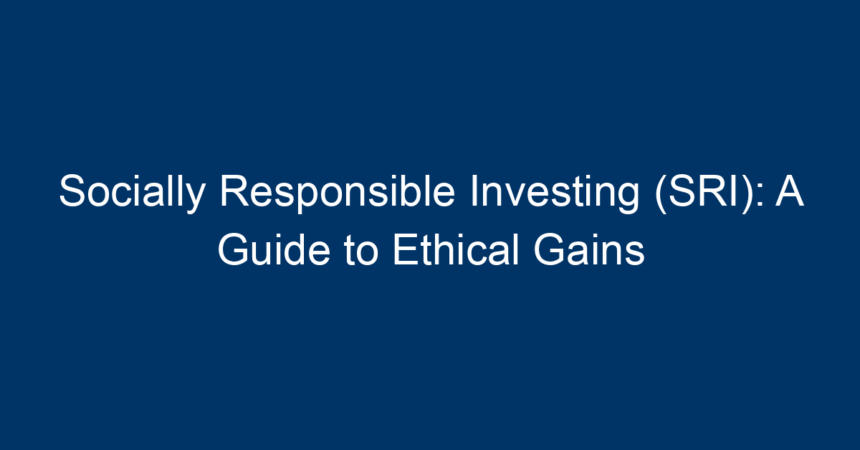In recent years, the landscape of investing has transformed dramatically, giving rise to a movement that prioritizes ethical considerations alongside financial returns. Socially Responsible Investing (SRI) has become a buzzword for investors who want their money to work not just for profit, but also for positive social and environmental impact. This guide will explore the foundations, benefits, strategies, and future of SRI, equipping you with the knowledge to make informed investment decisions that align with your values.
Understanding Socially Responsible Investing (SRI)
What is Socially Responsible Investing (SRI)?
Socially Responsible Investing (SRI) is an investment strategy that seeks to generate financial returns while also generating a positive social or environmental impact. Investors who engage in SRI typically avoid companies involved in industries perceived as harmful—such as fossil fuels, tobacco, or firearms—and instead seek out firms known for their ethical practices, sustainability, and contributions to society.
The History of SRI
The roots of SRI can be traced back to the 18th century, when religious groups began advocating for ethical investment practices, such as abstaining from funding businesses involved in slavery or alcohol. Over the decades, SRI evolved, gaining momentum during the civil rights movement of the 1960s and the environmental movements of the 1970s. In the 21st century, SRI has garnered mainstream acceptance, becoming a vital component of the global investment landscape.
The Benefits of Socially Responsible Investing (SRI)
Ethical Alignment
One of the most significant advantages of SRI is that it allows investors to align their portfolios with their ethical beliefs. Whether your concern is climate change, social justice, or corporate governance, SRI provides a way to invest in line with your values.
Financial Performance
Contrary to the common misconception that ethical investing compromises returns, many studies indicate that socially responsible investments can match or even exceed the performance of traditional portfolios. Companies that prioritize sustainable practices often enjoy enhanced reputations, stronger customer loyalty, and reduced risks, ultimately translating to better financial outcomes.
Risk Management
Investing in companies with strong ethical guidelines can help mitigate risk. For example, businesses that neglect environmental laws may face legal challenges, reputational damage, and regulatory fines, all of which can negatively affect their stock prices. In contrast, SRI focuses on companies that prioritize compliance and social responsibility, potentially offering a more resilient investment landscape.
Impact Reporting
SRI offers an additional layer of transparency through impact reporting. Many funds provide metrics on their social and environmental contributions, allowing you to see the tangible effects of your investments. This not only informs your investment choices but also fosters accountability within companies.
Key Strategies for Socially Responsible Investing (SRI)
Exclusionary Screening
Exclusionary screening involves deliberately avoiding investments in companies or sectors that do not align with investor values. This could mean steering clear of industries like fossil fuels, weapons manufacturing, or tobacco production. Investors can create a portfolio that reflects their ethical stance while maximizing their potential for social impact.
Positive Screening
In contrast to exclusionary methods, positive screening focuses on investing in companies that actively contribute to social good. This may involve supporting renewable energy firms, businesses with diverse hiring practices, or organizations with strong community engagement. Positive screening allows investors to channel their resources into companies making significant strides toward societal betterment.
Shareholder Advocacy
Engaging with businesses as a shareholder can also be an effective SRI strategy. By using your voice in company meetings or voting on proxy issues, you can advocate for more ethical practices—whether it’s improving labor conditions or reducing pollution. This approach empowers investors to leverage their influence to drive change within corporations.
Impact Investing
Impact investing goes beyond traditional SRI by prioritizing measurable social or environmental outcomes alongside financial returns. These investments may target specific issues like affordable housing, clean energy, or financial inclusion, providing investors with an avenue to generate tangible benefits while seeking financial growth.
Platforms and Resources for SRI
SRI Funds and ETFs
Numerous mutual funds and exchange-traded funds (ETFs) specialize in socially responsible investing. These funds typically employ rigorous screening processes to ensure their investments align with ethical standards. Both seasoned and novice investors can find options that suit their investment style and values.
Online Platforms
Several online platforms have emerged, offering tailored SRI options. These platforms provide extensive information about the companies they invest in, making it easier for investors to make informed choices. Some even curate portfolios based on specific themes, such as renewable energy, women-led enterprises, or sustainable agriculture.
Research and Advocacy Organizations
Various organizations focus on promoting SRI principles and conducting research to assess company practices. Resources from these organizations can help investors gain insight into which companies are genuinely committed to ethical practices and social responsibility. Examples include the Forum for Sustainable and Responsible Investment (US SIF) and the Global Impact Investing Network (GIIN).
Future Trends in Socially Responsible Investing (SRI)
Increased Investor Demand
As societal awareness of issues like climate change and social justice grows, so too does the demand for socially responsible investing. Investors are increasingly requesting that fund managers provide SRI options, indicative of a shift toward more ethical investment strategies.
Regulatory Support
Governments around the globe are implementing regulations to promote sustainable finance, encouraging firms to report on their sustainable practices and increasing transparency. New mandates may soon require investors to consider environmental, social, and governance (ESG) factors when making investment decisions.
Technological Innovations
Advancements in technology, such as blockchain and big data analytics, are expected to enhance the ability of investors to track the social and environmental impact of their portfolios. These innovations can enable more informed decision-making and foster greater accountability among companies.
Actionable Insights for Investors
Evaluate Your Values
Take the time to identify your personal values and how they align with your investment goals. Understanding what matters to you—be it climate change, social justice, or corporate governance—will guide your SRI strategy.
Research Investment Options
Before committing to any investment, thoroughly research the funds, companies, or platforms you’re considering. Look for those with strong screening processes and track records of social responsibility.
Monitor Your Investments
SRI is an ongoing process. Regularly examine the performance of your investments and their social impact. Adjust your portfolio as necessary to ensure alignment with your original intent and evolving values.
Engage and Advocate
Consider becoming an active participant in the companies you invest in. Use your shareholder rights to advocate for ethical practices, fostering a culture of responsibility within the corporate sector.
Conclusion: Investing for a Better Future
Socially Responsible Investing (SRI) is more than just a trend; it’s a movement toward a more ethical and sustainable financial landscape. By understanding the foundations of SRI, exploring various strategies, and utilizing available resources, you can position yourself to contribute positively to society while reaping financial rewards. The future of investing holds the promise of balancing profit with purpose—a journey well worth undertaking.
By integrating socially responsible investing (SRI) principles, you can help create a better world while also paving the way for a stronger financial future. The choice is in your hands; now is the time to take action and make your investments count!




